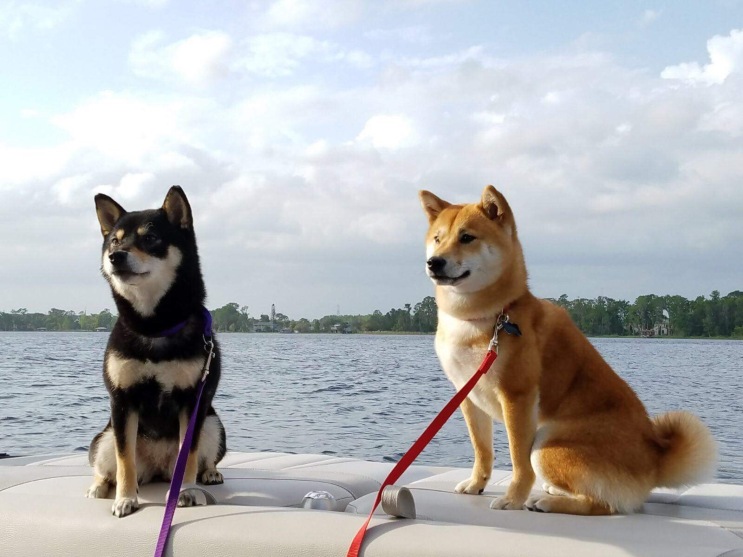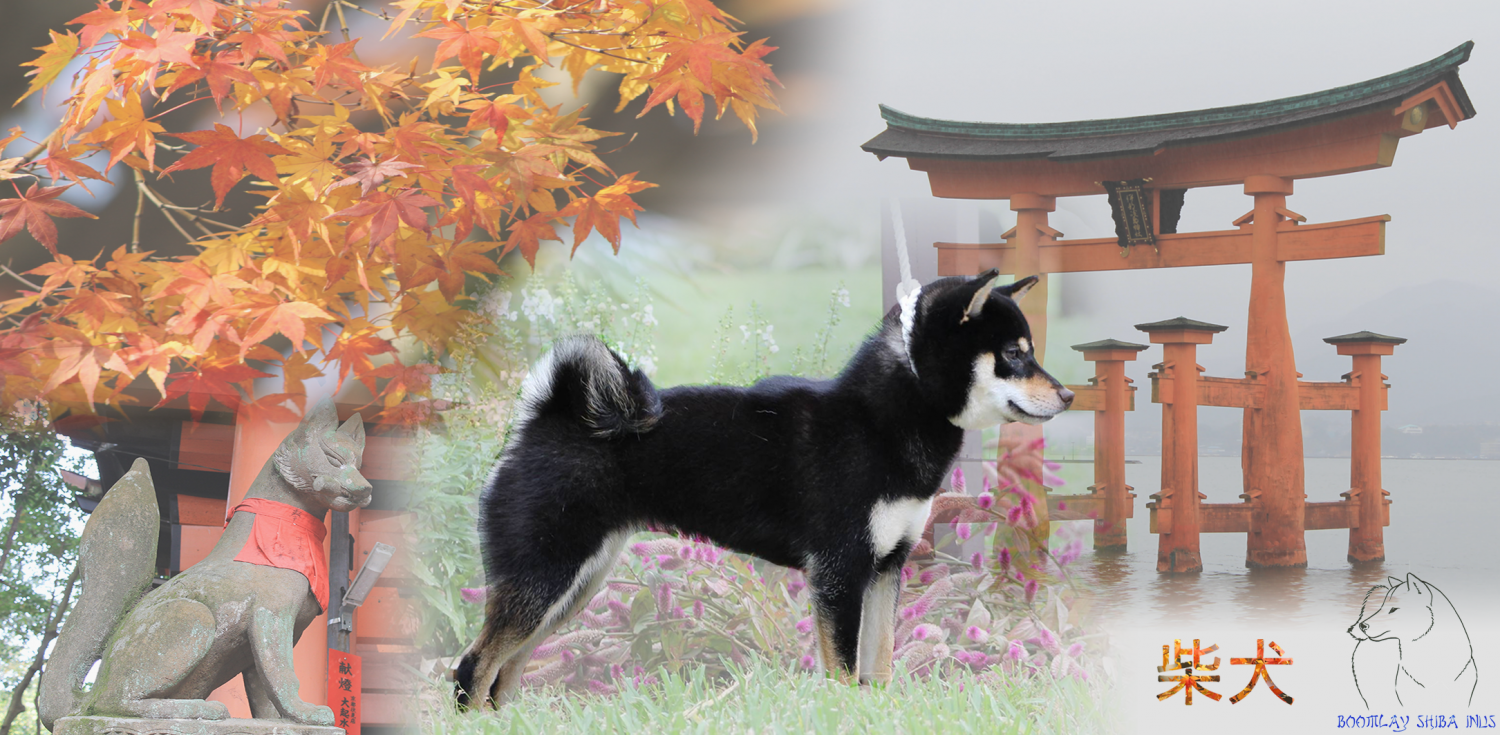
There are three words that the Japanese use to describe the Shiba Inu’s temperament:
Kan-i is bravery and boldness combined with composure and strength. Ryosei is good nature with a gentle disposition. Kan-i & Ryosei are opposites; one cannot exist without the other. The last word to describe the Shiba Inu is Soboku which is artlessness with a refined & open spirit. All three of these characteristics combined make the Shiba a Shiba.

Easy way I found to catch my Shiba after a Fast CAT run is to call them to me & pick them up. I work on recall at a very young age, it’s not foolproof but every single time I’ve gotten my dogs to come back, regardless if they’ve gotten loose in the woods, the swamp, during our walk, or the backyard.

Shiba Inu are the smallest of the Nihon Ken. They were bred to hunt small game in the mountains of Japan. Because of their history as hunters most Shiba tend to have some kind of prey drive. This is one reason it’s discouraged to let your Shiba off lead. It’s not uncommon that a Shiba will take off after a bird, squirrel, cat, or plastic bag without a second thought and their owner will have a hard time recalling them. Unfortunately many Shiba have been killed in their pursuit of their prey due to oncoming traffic.
Shiba can also be very good escape artists, they may get bored in their backyard (I always recommend supervision when you have any pets outside) or they may find a scent that must be tracked. Chain link fences can easily be climbed, and broken slates are no problem to squeeze through. Collars are another thing that can lead to loose Shiba. I recommend Limited slip collars (White Pine Outfitters carries a good selection), a martingale collar, or even a correctly used check collar or collar and prong duo (I recommend this leash for a collar/prong set) NOT a flat buckle collar. If recall isn’t trained for, then it can be very hard to get this independent hunter to change its mind and come back.

Shiba love to be included in ‘adventures’ with their families, but they do have an off switch and will happily lounge on the couch with their owners, as long as they get plenty of exercise or mental stimulation throughout the day. I found that Shiba can have a quiet, regal air about them with a hint of aloofness in public, or they have a silly, energetic side when meeting people. The former being more common than the latter.

Shiba tend to a clean breed – I often heard of Shiba who often don’t care to play in the mud or the water, and dislike the rain. My Shiba personally don’t mind rain, mud, or water. They excitedly roll in dead animals found on hikes and in the mud. They love to splash and wade in water, to the point of beelining to it when we go hiking. I found that Shiba also enjoying digging. Thanks to their double coat you don’t have to bathe them very often, I tend to only bathe mine if they have a show/public outing coming up or if they get particularly disgusting from a hike. The harsh outer coat keeps dirt & mud from sticking to their fur and getting into their soft undercoat. Once the mud dries it will fall right off. Another characteristic of a double coat is that they do shed twice a year – during this time they need constant grooming to get rid of the old undercoat. I would suggest using an undercoat rake or a dog blow dryer to get rid of the dead coat, not a furminator as it will damage the coat.
As puppies they’re very easy to housebreak – they don’t like to soil their living areas, which makes crate training a breeze. I start crate training at 5 weeks old, at that age they’re going outside to go to the bathroom and will not potty in the crate. Shiba puppies really tend to use their mouth to explore their environment, so a crate will keep them safe when they aren’t supervised. Plus if there is ever an emergency where you need to evacuate, your Shiba will be crate trained and not as likely to raise a fuss when in a shelter (where pets must be caged) or if it needs crate rest due to a injury or surgery.
Shiba are generally a healthy breed. Good, reputable breeders screen for things such as hip dysplasia, luxating patellas, and get an eye exam with the results registered with OFA (It’s suggested the eye exam is done annually). The breed may have issues with glaucoma and mild to severe food intolerances. I’ve also seen a increase in Shiba developing epilepsy. There is no genetic marker for epilepsy, and it tends not to develop until a dog is 2 – 4 years old. I’m a firm believer that a dog should be at least 2 years old before being bred, especially when the possibility of epilepsy is involved. A good, reputable breeder will be upfront and honest with any issues that their line may potentially have. Here’s a list of the minimum health testing a Shiba should receive before being bred : OFA Shiba Inu requirements

Being a primitive breed, Shiba are more suited for an dedicated dog owner – first time owners can do well as long as they’re firm and set boundaries. Shiba are a smart breed but they need proper motivation in order to get them to listen to what you want. Coming from a line of independent hunters, a Shiba was bred to think for itself. Split second decisions could help a Shiba stay safe when hunting in the mountains. With this background it can make them a bit of a challenge to train at times. If allowed to, Shiba will resort to natural, but unwanted behaviors such as food/resource guarding, dog aggression (they’re notorious for being same sex aggressive), and even aggression to humans, BUT this doesn’t have to be the case. With proper training & socialization, in addition to a good genetic background, your Shiba will be the best adventure partner you can ask for!
It’s highly recommended you take your pup to puppy kindergarten classes & socialize them to multiple aspects of daily life included but not limited to: strangers of all backgrounds/walks of life, urban areas, outdoor restaurants/bars, well behaved, balanced dogs. Socialize your Shiba to set them up for success in life.

Some of the best things about Shiba are their convenient size, willingness to accompany you anywhere, and that they usually make very little noise (except that shrill Shiba scream – beware of that during bath and nail clipping/grinding time, or with anything they find unpleasant). They are extremely loving and loyal to their family. Nothing is cuter than a squinty eyed Shiba making airplane ears, with a happy smile on their face and their whole back end wagging when you come home from work. This is a special reaction reserved for owners/family members and highly esteemed friends. If that isn’t special I don’t know what is!
While the Shiba isn’t the dog for everyone – if you decide to make the commitment I know you won’t be disappointed!

More information on Shiba:
The Shiba by Shigeru Kato
Shiba Inu as Hunting Dog by Nobuo Atsumi
A Journey Beyond Shiba II by Nobuo Atsumi
What makes Shibas A SHIBA INU by Nobuo Atsumi
About the Shiba by the National Shiba Club of America
Breed History by the National Shiba Club of America
In Search of the Modern Shiba Inu by Éadaoin Ishii
Korotama the Pinto Proto-Shiba by Éadaoin Ishii
About the Mame Shiba by Éadaoin Ishii


